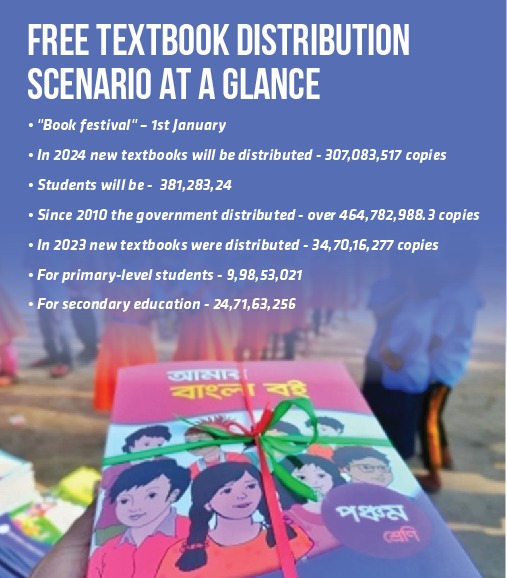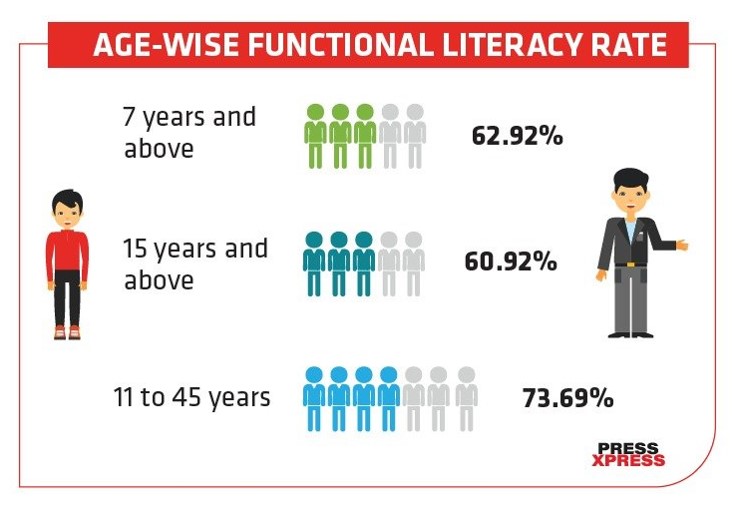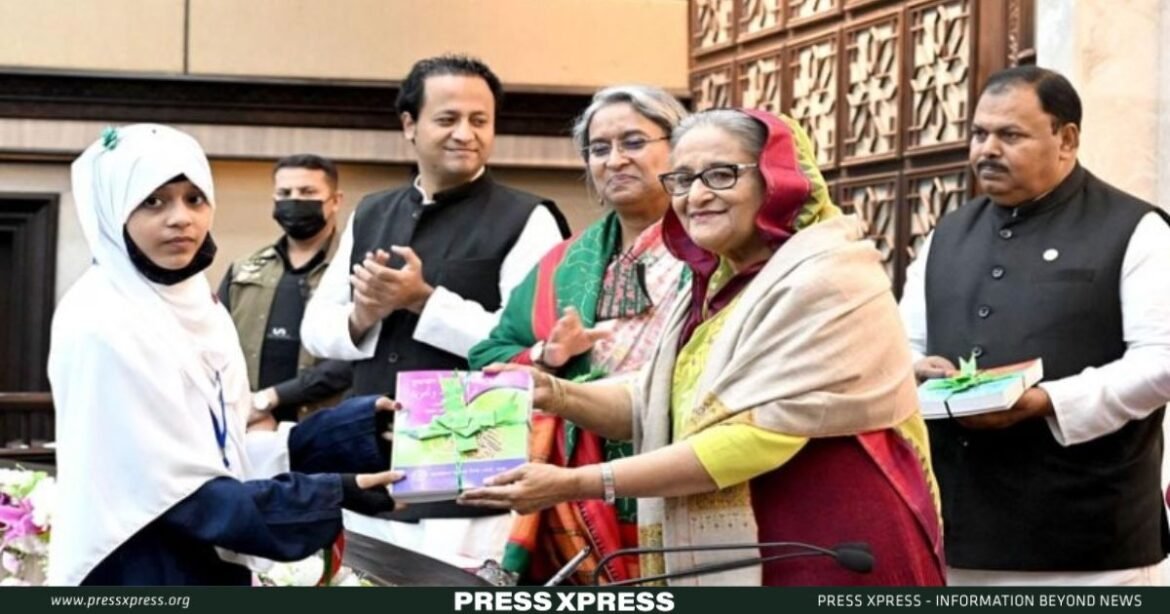The government’s steadfast dedication to providing free textbooks underscores a powerful commitment to investing in the nation’s future
On December 31, 2023, Prime Minister Sheikh Hasina initiated the distribution of free textbooks for the academic year 2024. The distribution activities commenced nationwide on January 1, 2024, starting among primary and secondary school students. The launch event took place at the National Government Primary School in Dhaka’s Mirpur. The authorities have produced these educational materials adhering to established benchmarks for students at pre-primary, primary, secondary, Ebtedayee, and SSC levels. All students receive complimentary textbooks on the inaugural day of the New Year, ensuring widespread access to essential learning resources.
You can also read: AL Govt’s 2024 Vision: Commodity Price Control

In many ways, Bangladesh has held a special place for itself on the world stage. The world has never seen anything like the distribution of brand-new textbooks to primary and secondary school students at no cost at the start of each academic year. Every year at the start of the school year, a massive quantity of textbooks is provided to every student, an endeavor that might be unmatched globally. Since 2010, the government has been handing out books right at the start of classes.
Free Textbooks Distribution Festival Scenario of Bangladesh 2024
The Awami League government celebrates the “book festival” on January 1 every year to improve the standard of education and lower the dropout rate.
The ministries involved have taken necessary steps to distribute 307,083,517 copies of new textbooks among 381,283,24 students nationwide. Since 2010, the government has distributed over 464,782,988.3 copies of free textbooks to students up to secondary levels. Additionally, since 2017, the government has been distributing braille books to visually impaired students and providing versions in various ethnic languages such as Chakma, Marma, Tripura, Garo, and Sadri to cater to students from these groups studying in their mother languages.

The National Curriculum and Textbook Board (NCTB) reported the delivery of 100% of books up to class seven to the upazilas. However, 20-25% of books for classes eight and nine are yet to be printed. The Upazila education office coordinates and distributes books based on the demands of educational institutions. NCTB assured that the remaining books for classes eight and nine would be printed and delivered within the month.
Although there was no central distribution program for secondary-level textbooks, various institutions across the country are distributing books to students. The Ministry of Education announced that textbook distribution activities would continue until the afternoon, ensuring that all students receive their books.
State Minister for Primary and Mass Education Ministry, Md Zakir Hossain, attended the event as the chief guest, while Secretary Farid Ahmed was a special guest, and the Directorate of Primary and Mass Education Director General Shah Rezwan Hayat chaired the ceremony.
Free Textbook Distribution in the Previous Year
According to the National Curriculum and Textbook Board, the distribution of textbooks in 2023 encompassed 34,70,16,277 copies, reaching students in various categories including pre-primary, primary, secondary, ebtedayee, dakhil vocational, SSC vocational, ethnic minority groups, and visually challenged students across the nation. Notably, 24,71,63,256 textbooks were allocated for secondary education, while 9,98,53,021 were designated for primary-level students.
Free Textbook Distribution Outcomes in Bangladesh
Free textbook distribution in Bangladesh has had far-reaching positive outcomes. Free textbook distribution outcomes in Bangladesh are discussed below;
Educational Equality
Free textbook distribution in Bangladesh has significantly contributed to educational equality. It ensures that all students, regardless of socio-economic background, have access to essential learning materials, narrowing the educational gap.
Increased Enrollment Rates
The initiative has led to a surge in school enrollment rates. As textbooks are provided at no cost, more parents are encouraged to send their children to school, boosting overall attendance and participation. In 2021, there was a notable 7.7% rise in girls’ participation in secondary education, accompanied by a substantial decline in dropout rates from 14.7% to 3.5%. Additionally, a significant achievement was recorded as 50.95% of females successfully accessed secondary education during the same year. Moreover, the proportion of female educators demonstrated a commendable increase, reaching 26.65% in 2021, marking a substantial improvement from the 2010 rate of 19.53%.
Literacy Advancement
The widespread availability of free textbooks has played a crucial role in improving literacy rates. With access to essential reading materials, students are better equipped to develop strong foundational skills in language and comprehension.
The country’s current functional literacy rate for individuals aged 7 years and above is 62.92 percent, while the overall literacy rate is 74.23 percent. Notably, within the age group of 11 to 45 years, the functional literacy rate has experienced a significant increase, reaching 73.69 percent in 2023 compared to 53.70 percent in 2011.

Additionally, the functional literacy rate for individuals aged 7 to 14 years is currently at 72.97 percent, whereas for those aged 15 years and above, it stands at 60.77 percent. These figures were unveiled during the publication ceremony of the “Literacy Assessment Survey (LAS) to Monitor Sustainable Development Goals (SDGs) Project” at the Bangladesh Bureau of Statistics (BBS) auditorium on July 17.
Poverty Alleviation
By eliminating the financial burden of purchasing textbooks, the program contributes to poverty alleviation. Families can redirect funds to other essential needs, breaking the cycle of poverty and promoting a more sustainable future.
Quality of Education
Free textbooks ensure that students and teachers have the necessary resources to enhance the quality of education. Teachers can plan more effectively, and students can engage in independent learning, fostering a more dynamic educational environment.
Community Empowerment
The initiative fosters a sense of community empowerment as it involves local communities in the distribution process. This not only ensures that the right resources reach the right students but also creates a collaborative effort to support education at the grassroots level.
Government Commitment to Education:
The distribution of free textbooks reflects the government’s commitment to prioritizing education. It sends a strong message about the importance of investing in the future through the empowerment of the younger generation.
Free textbook distribution in Bangladesh has had far-reaching positive outcomes.
Conclusion
The Free Textbook Distribution Festival in Bangladesh marks a remarkable commitment to education by Prime Minister Sheikh Hasina’s government. The initiative, sustained since 2010, has not only achieved widespread distribution of educational materials but has also significantly contributed to educational equality, increased enrollment rates, literacy advancement, poverty alleviation, improved quality of education, and community empowerment. The government’s steadfast dedication to providing free textbooks underscores a powerful commitment to investing in the nation’s future.


